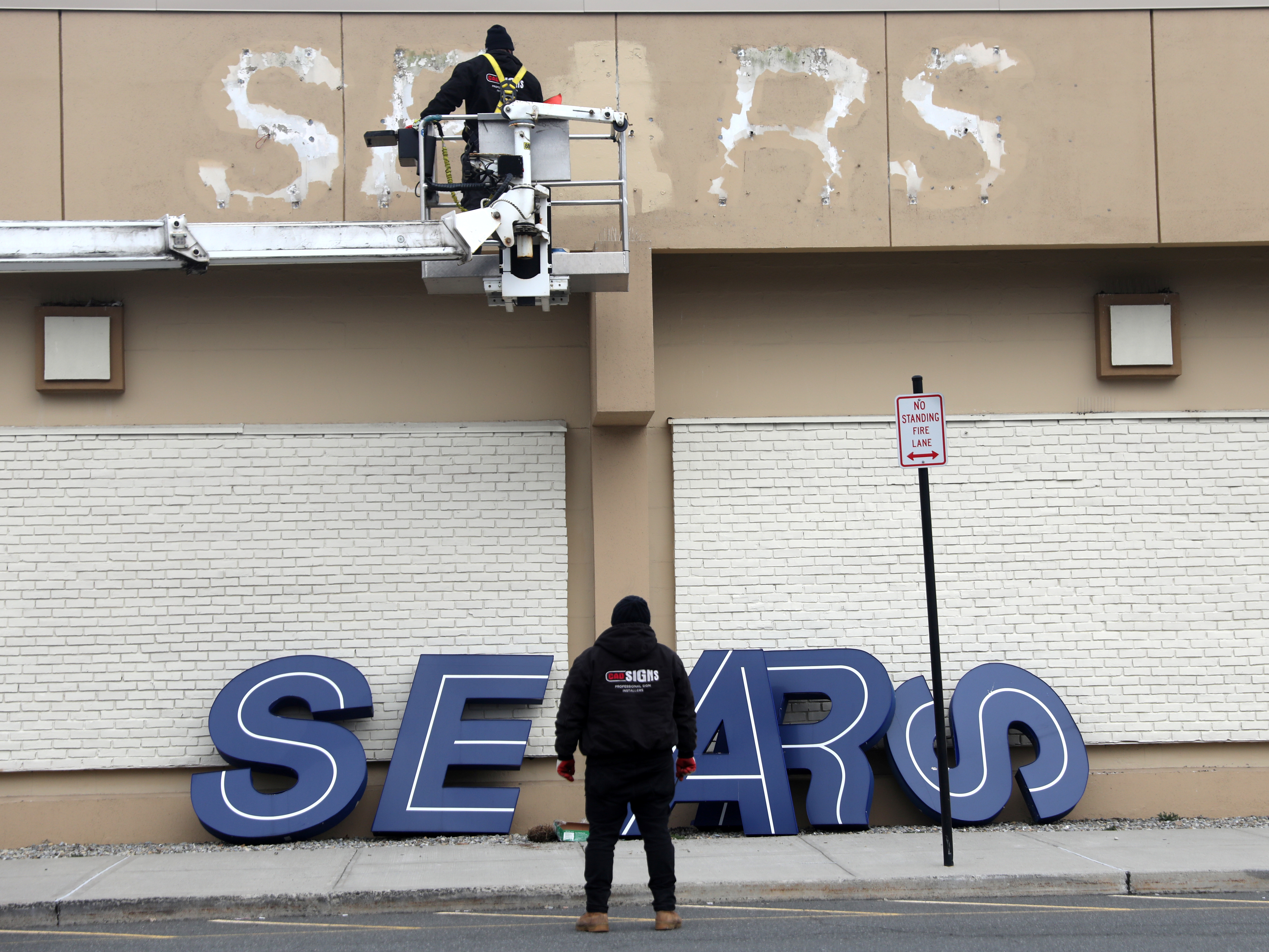- Sears was once the largest retailer in the world, with a sky-scraping headquarters and legacy brand status.
- What started as a humble mail-order watch and jewelry service in 1886 soon shot to popularity through its affordable catalogs.
- But with the changing retail landscape, sales fell from $43 billion in 2010 to less than $17 billion in 2017.
- By February 2020, a mere 182 stores are expected to remain in operation, down from 3,500 stores in 2010.
- Visit Business Insider’s homepage for more stories.
Few chains have fallen from grace quite like Sears.
Ten years ago, the department-store chain operated 3,500 stores. By February, Sears’ and Kmart’s combined stores are expected to fall to just 182 locations.
Things didn’t always look so bleak for the retailer. Officially founded in 1893, Sears was once the world’s largest retailer, reporting billions of dollars in profits. With a headquarters located in the Sears Tower, once the tallest building in the world, Sears’ influence was known worldwide.
However, changes in consumer behavior and the retail landscape has resulted in the demise of one of the United States’ most storied department-store chains.
Here is a timeline of the rise and fall of Sears, starting at its humble beginnings in the 1800s.
Richard W. Sears founded the R. W. Sears Watch Company in 1886 in Minneapolis, Minnesota.

A railroad station agent, Sears started the mail-order watch and jewelry company as a way to supplement his income.
Sears relocated his business to Chicago in 1887 and, shortly after, hired Alvah C. Roebuck as a watch repairman. Sears sold his watch business in 1889.
In 1893, he founded another mail-order service with Roebuck, which the two named Sears, Roebuck and Company.
In 1895, Richard W. Sears began planning and writing the soon-to-be-famous Sears catalogs.

After being purchased and reorganized by clothing manufacturing mogul Julius Rosenwald, the company began to grow exponentially.
The company specialized in selling low-cost merchandise to rural areas that did not have access to stores. These would-be customers would receive the Sears catalog in the mail. The catalogs shot the company to insane popularity, with many comparing its rise to fame to that of Amazon.
The popular catalogs offered discounts on many items.
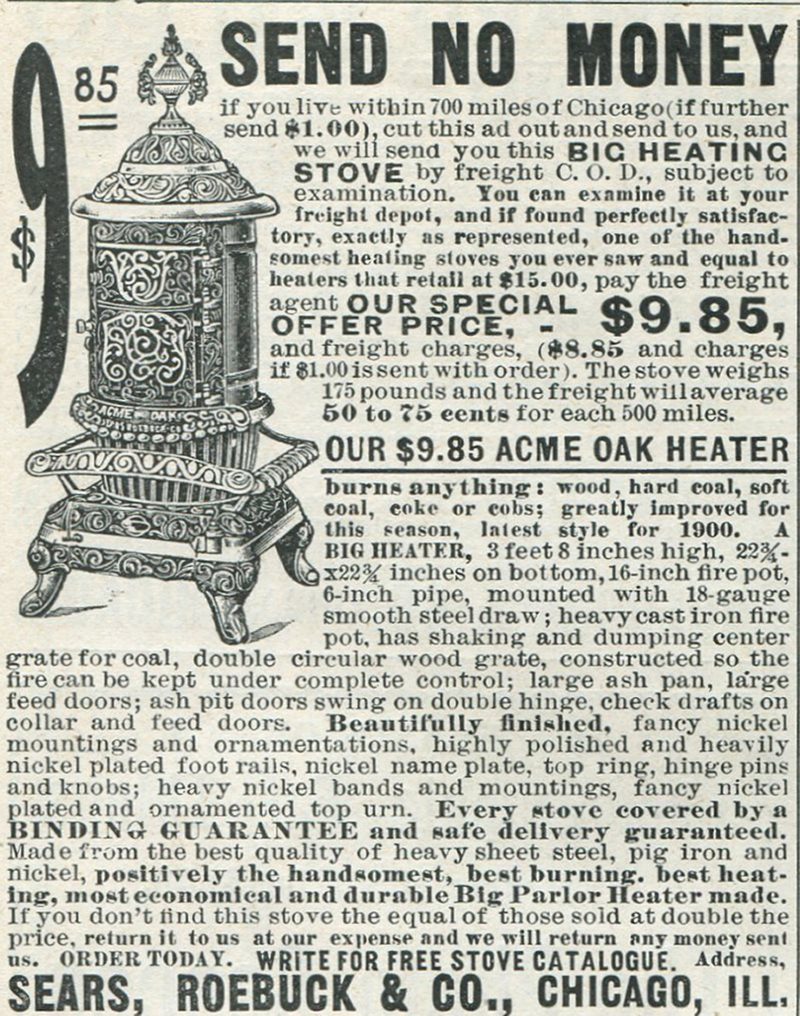
Similar to a "no money down" offer, customers could send their Sears catalog ads to a company, receive the product, and pay for it once it arrived and they had inspected it.
Three years after Sears held its IPO — becoming the first major US retailer to do so — clothing mogul Julius Rosenwald took over as president.
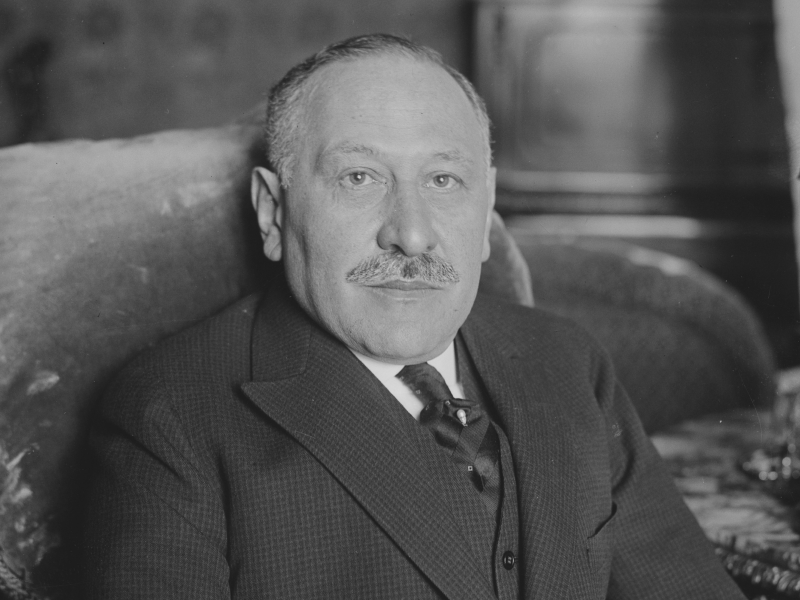
In 1906, Sears became the first major US retailer to sell its stock in an initial public offering. According to CNBC, Goldman Sachs handled the IPO at the time. It traded at $97.50 a share.
That year, Sears also opened its catalog plant and the Sears Merchandise Building Tower in Chicago.
In 1909, Rosenwald (pictured) took over as president of the company.
But at the end of World War I, farmers were hit with a severe depression, and Sears fell into "dire" financial shape.

Rosenwald was able to bring Sears away from the brink of bankruptcy by pledging $21 million of his personal fortune and other assets to save the company. By 1922, Sears had regained financial stability.
Rosenwald stepped down as Sears president in 1924, after which he dedicated his life to philanthropy. He donated millions of dollars to public schools, colleges, universities, museums, Jewish charities, and black institutions.
In 1925, the first Sears retail store opened in Chicago under the direction of business executive General Robert E. Wood.
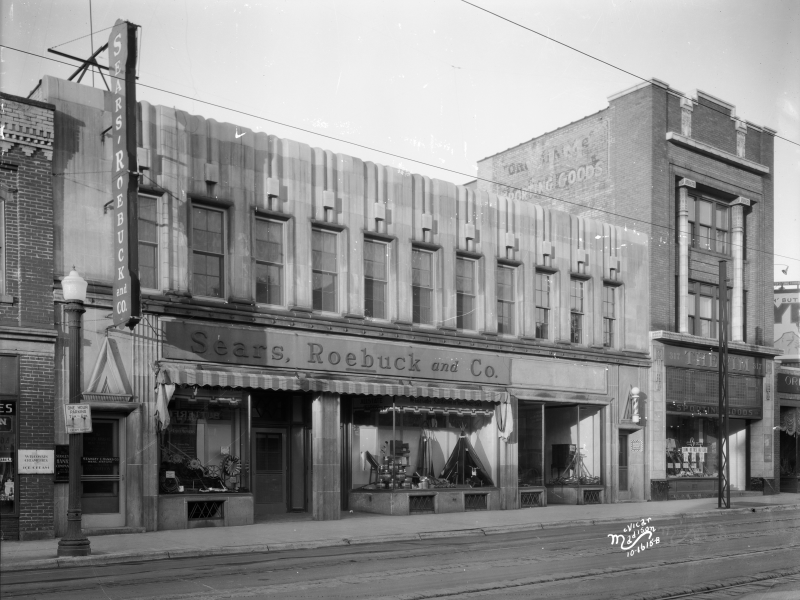
In 1928, Wood officially became president of Sears, Roebuck and Company. He would stay on at the company in various high-level positions until his retirement in 1954.
As the automobile became increasingly popular, Wood reasoned that customers could travel from near and far to visit Sears' department stores.
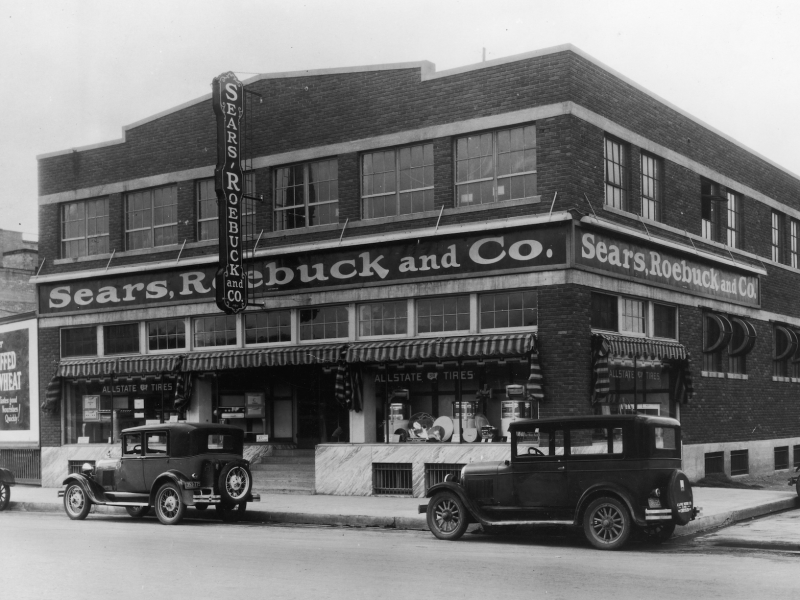
The first retail location set off a massive chain reaction of store openings. Seven more stores opened in 1925 alone, and by 1931, in-store sales had topped mail-order sales.
Sears also founded its Allstate Insurance Company in 1931 as a response to the rise in automobile ownership.
In 1945, Sears made $1 billion in sales — the equivalent of $13 billion today.

Relatively unphased by the crash of 1929 and the subsequent Great Depression, Sears sales continued to hold steady.
Sears stores were extremely popular, and the company's catalogs and "Wish Books" continued to bring in sales.

Sears was one of the first department stores to cater to both men and women, as well as sell household goods and appliances.
Consumers loved Sears' signature low prices, and soon Sears' main market shifted from urban to suburban consumers.

According to History, the Sears name soon became "synonymous with the suburban shopping experience."
With an increased focus on suburban living, Sears began to pay more attention to its automobile ventures.
In 1951, the company released its newest mail-order automobile, the "Allstate," named after the Sears-owned insurance company.
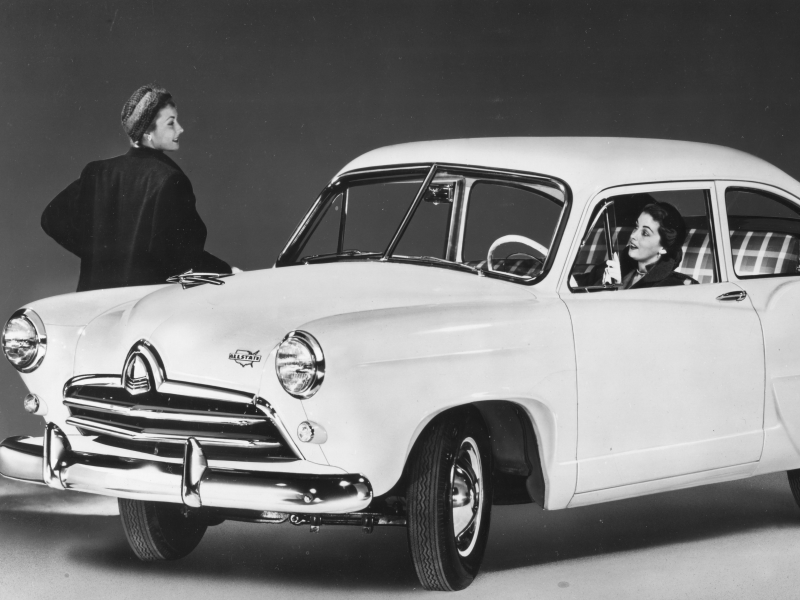
The company had been selling cars as far back as 1909, but this stylish ride was certainly an upgrade from its motor buggy.
Sears reached new heights in 1969 by breaking ground on the Sears Tower in Chicago.
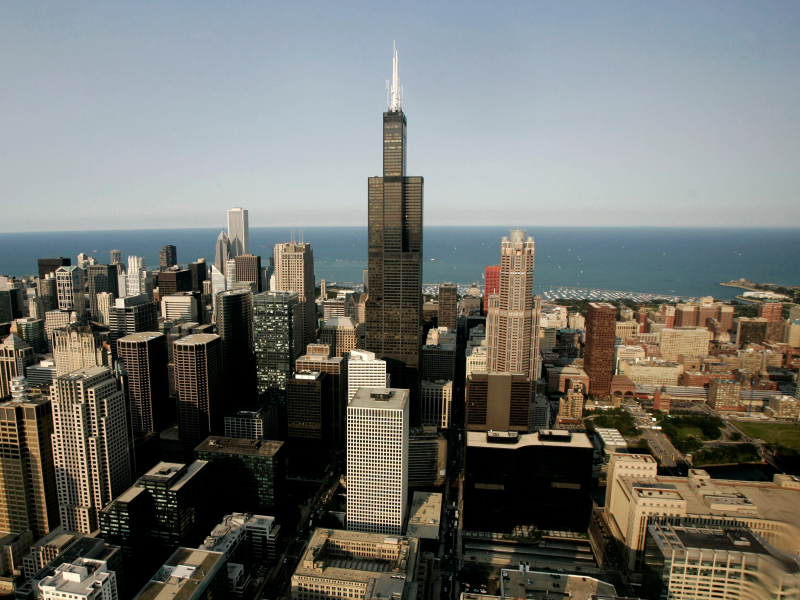
The 110-story building cost $100 million to build. Upon its completion in 1973, it was the tallest building in the world. It would hold this title for more than 20 years.
The Sears Tower, which was renamed the Willis Tower after 36 years, was used as an office for Sears' main merchandising group and company headquarters. Space in the building was also rented to outside tenants.
From the end of World War II into the 1970s, Sears sales were at an all-time high.

According to the New York Times, the retailer had over 350,000 employees in its ranks and was able to provide many of them a clear path to the middle-class. Employees were paid well and the company's benefits allowed Sears employees to retire comfortably.
As malls grew in popularity throughout the 1980s, Sears became an anchor store in many plazas.

However, the business was shifting.
In the early 1980s, Sears employees were informed they would no longer receive commissions from sales.

This included sales of items like vacuum cleaners, cordless drills, and ready-to-wear clothing.
Before, store managers could also choose which items they stocked in their stores. However, in an effort to make Sears stores more uniform, this option was taken away.
Many store managers felt slighted by this, as they could no longer stock more of the items they knew their customers wanted.
In 1986, Sears expanded into financial services with the launch of the Discover Card through Dean Witter Financial Services Group, a subsidiary of Sears.

Early versions of the Discover Card included small pictures of the Sears Tower. According to the company, the first purchase made with a Discover Card was on September 17, 1985, by a Sears employee at a Sears store in Atlanta, Georgia. The purchase was for $26.77.
In 1990, Sears lost its spot to Walmart as America's biggest retailer.

According to CNBC, Walmart's sales rose to $32.6 billion, up 26%. Sears' sales, on the other hand, only rose 1.2%. However, the company's sales for 1990 still landed at $31.9 billion.
In 1993, Sears discontinued its famous catalog to focus on in-store retail operations.
Two years later, in 1995, the company spun out its largest subsidiary, the Allstate Corporation, which had grown from the insurance company Sears founded in 1931.
The company also began offering car and electronic repair services in addition to its regular inventory of home goods, clothing, and appliances in an effort to attract more customers.
In the early 2000s, Kmart acquired Sears to form a new major company, Sears Holdings Corporation.

Sears purchased clothing company Lands' End for $2 billion in 2002.
In 2003, Sears sold its credit-card business to Citigroup in order to focus exclusively on its retail operations. At the time, the credit-card business was outpacing retail and accounted for 60% of Sears' annual profits.
In 2005, Sears' completed its merger with Kmart, which had surpassed Sears to become the second-largest retailer in the United States, behind Walmart.
After Sears was purchased for a whopping $11 billion, both companies became subsidiaries of the newly formed Sears Holdings Corporation, with hedge fund manager Eddie Lampert as its chairman.
In 2007, Sears' stock hit an all-time high at $195.18 per share.

Sales rose after Lampert became chairman of the newly combined company.
However, retail was becoming increasingly dependent on online sales. As soon as sales had begun to climb, they just as quickly began to drop.
In 2013, Lampert was made CEO in the hopes that he could turn sales around. However, the company's problems had just begun.
In 2015, Sears' revenue fell from $36.2 billion two years prior to $25.1 billion.
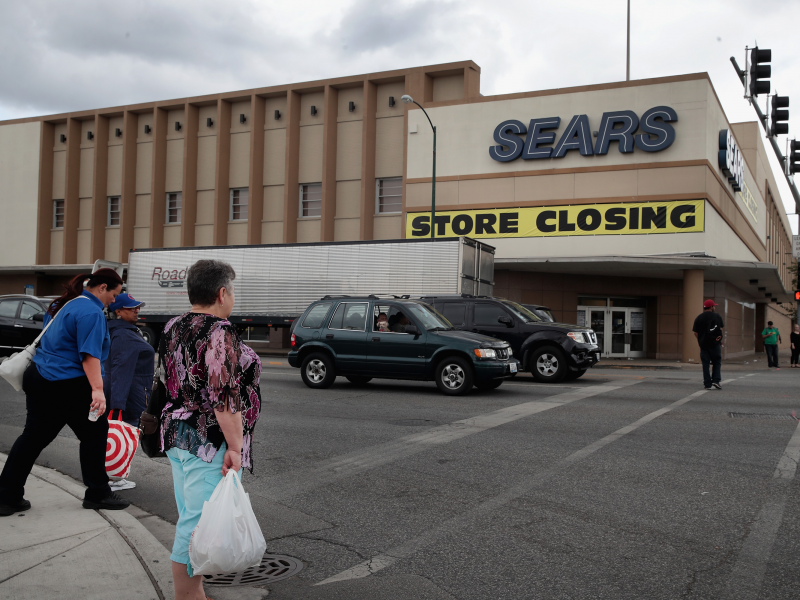
Increased competition with other big-box retailers and the rise of Amazon and online shopping spelled out the end for Sears.
Within the company, tensions were brewing between lower-level management, employees, and Eddie Lampert. In an effort to cut costs and turn the company around, Lampert began ordering underperforming stores nationwide to close.
In 2016, based on employee reviews from Glassdoor, 24/7 Wall St reported that Lampert was the most hated CEO in the US.
Many stores were left empty after employees were cut and the company's Shop Your Way rewards program began to flounder.

Employees blamed deteriorating stores and employee shortages on Lampert.
"There are so many people running for the door not just because the ship is sinking, but because the captain of the ship is screaming at them, blaming it on them, and telling them it's their fault," one former vice president told Business Insider in 2016.
As sales fell even further, Sears had no choice but to close many of its locations.

In 2010, the company operated more than 3,500 Kmart and Sears stores. However, more than 3,000 locations have since closed.
According to a 2019 article by Business Insider, Sears sales tumbled from $43 billion in 2010 to less than $17 billion in 2017.
In October 2018, the company officially filed for Chapter 11 bankruptcy.

At the time of the bankruptcy filing, Sears reported that less than 700 stores were still open and 68,000 employees remained.
After the company filed for bankruptcy, Lampert stepped down as CEO. He would stay on, however, as a chairman to oversee the bankruptcy proceedings.
In an effort to save the company from closing all of its stores, Lampert purchased the company out of bankruptcy four months later. The $5 billion deal preserved around 45,000 jobs from termination and meant that roughly 425 Sears and Kmart stores would remain open.
Sears proceeded to take legal action against Lampert.

In April 2019, the retailer sued the former CEO and others, including former board members, claiming they had stolen billions of dollars from the retailer.
After turning down a $1.6 billion offer from Timmy Hilfiger to buy Lands' End, Lampert was accused of doing so in order to protect his hedge fund's equity stake in Lands' End. Accusations also included that Lampert "reaped at least $490 million from a spinoff of Lands' End that did not benefit Sears."
"Altogether, Lampert caused more than $2 billion of assets to be transferred to himself and Sears' other shareholders and beyond the reach of Sears' creditors," the lawsuit alleged.
The lawsuit has not yet been settled. In a statement, Lampert's ESL Investments, Inc. called the allegations "misleading or just flat wrong."
Store closures and corporate layoffs have continued for the once-great retailer.
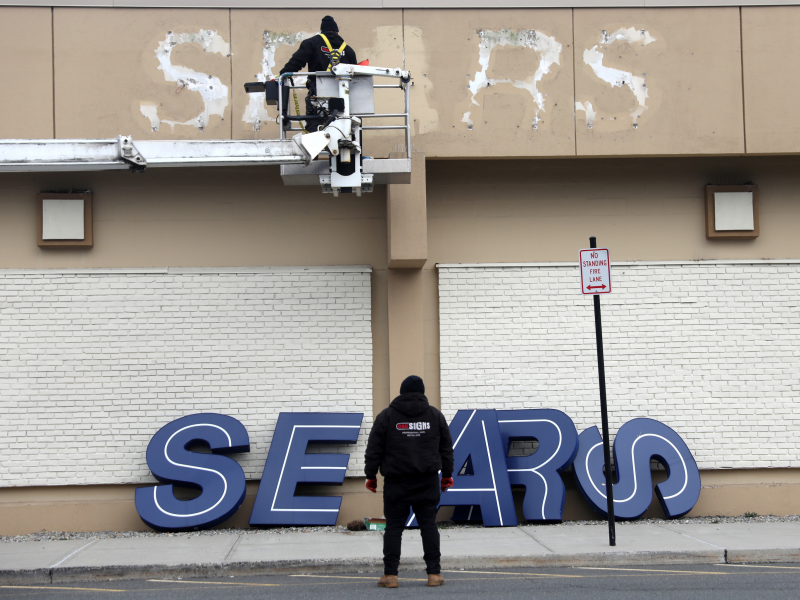
What was once America's largest retailer is expected to operate a dismal 182 Sears and Kmart stores by February 2020.
After managing to survive two World Wars and the Great Depression, Sears has no doubt fallen victim to what's been dubbed as "the retail apocalypse."
- Read more:
- Sears is closing more stores, with some layoffs starting 2 days before Christmas
- Sears debuts handwritten signs in stores in an apparent effort to slash costs
- The rise and fall of Subway, the world's largest fast-food chain
- The rise and fall of Bed Bath & Beyond, one of America's most iconic big box retailers

